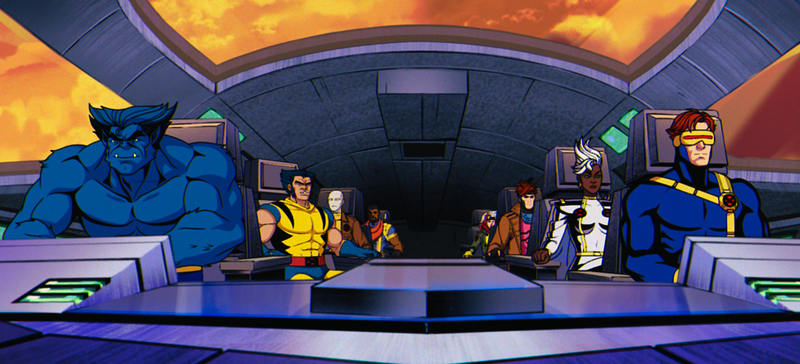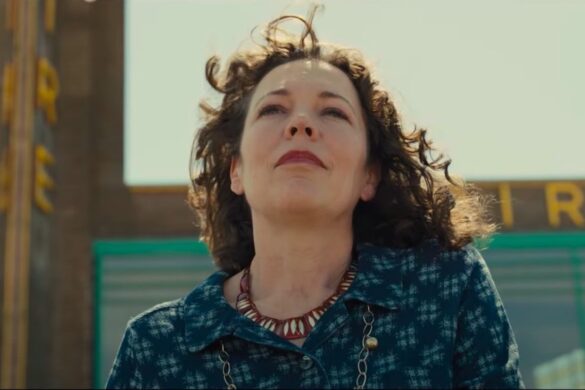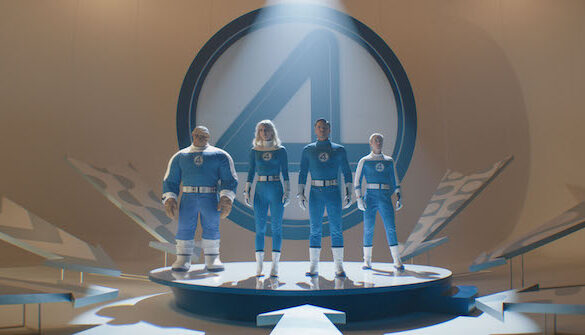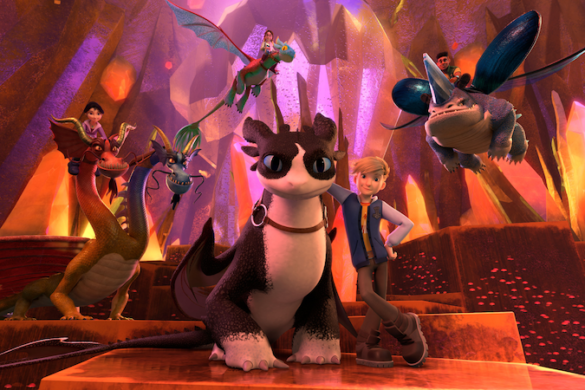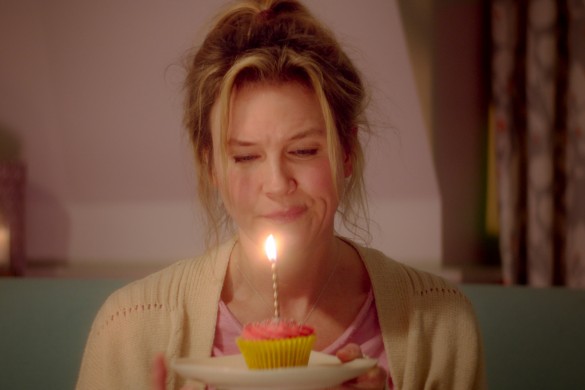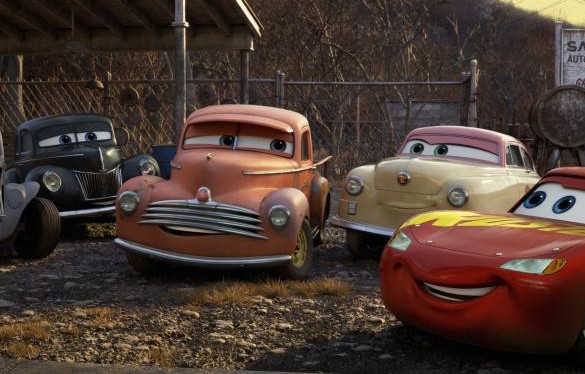“X-Men ’97” is a revival series that feels like no time has passed since it ended 24 years ago. Those who grew up with the 90s Saturday morning cartoon would remember its dramatic pathos and the cinematic superhero action that would pop off the screen. It defined must-see TV for fans of all ages. Because it was more than just superpowered beings fighting robots, superpowered villains, aliens, and evil time travelers, this was a show that had seasons with overarching plots, intricate story arcs, complex character dynamics, and an embrace of the original source material while embedding the social commentary the helped shape the comics we all read today.
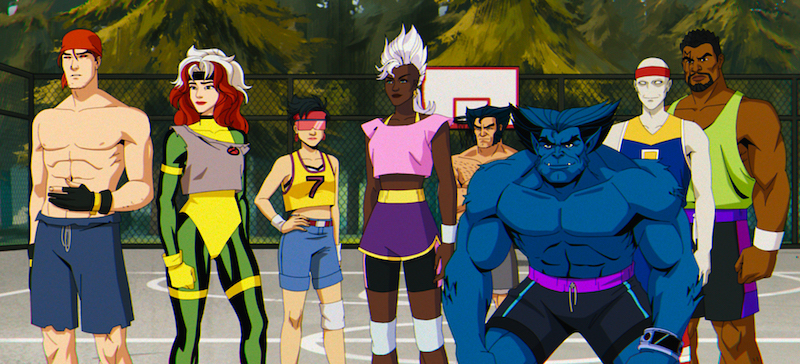
(L-R): Gambit (voiced by AJ LoCascio), Rogue (voiced by Lenore Zann), Jubilee (voiced by Holly Chou), Storm (voiced by Alison Sealy-Smith), Wolverine (voiced by Cal Dodd), Beast (voiced by George Buza), Morph (voiced by JP Karliak), and Bishop (voiced by Isaac Robinson-Smith) in Marvel Animation’s X-MEN ’97. Photo courtesy of Marvel Animation. © 2024 MARVEL.
We had the chance to see the first three episodes, which pick up shortly where the original left off
when an attempted assassination of Professor Charles Xavier left the powerful telepath sick with a near incurable virus. He is entrusted to Lilandra, Empress of the Shi’ar Empire, with whom she shares a lifelong bond. But it left his students without their beloved teacher. Though they go on missions hoping to extinguish the remnants of hate and prejudice the Friends of Humanity carry out, the team is barely holding it together. Their latest mission to rescue Roberto De Costa, aka Sunspot, from his Friends of Humanity Captors, who want to sell weapons-grade Sentinel parts and repurpose them for their nefarious agenda, ends with success. But it doesn’t change that this family barely holds together, especially when Cyclops and Jean consider leaving to start new lives.
In the act of self-preservation, Roberto argues he can’t help with what he’s born with and tries to pay off his captors for his freedom. To which the Friends of Humanity goons say they don’t care about that convenience. In a way, Roberto is our guide to a changing era of the X-Men: The Animated Series, like the way Jubilee was when the show made its debut back in 1992. He is experiencing the same sort of confusion she did when she was rescued and taken to the Xavier mansion. He doesn’t want to accept that he is a mutant and is shocked at what he sees.
“To Me, My X-Men” reintroduces our favorite characters and the state of their world and reexamines all the dynamics that tie it together. For those unfamiliar with the series, it feels like “X-Men ’97” hits the ground running. It wastes no time with exposition. Instead, it organically inserts all the narrative pieces and follows a narrative structure similar to the pilot episode. We get to see the team in action while also getting to see them use their unique powers and individual personalities. The dynamic action is fun and fast-paced, and the new wider aspect ratio creates a cinematic viewing experience.
X-Men is a five-season series that has a loyal fanbase. Even so, there is such a wealth of information that newcomers will miss. And it gets even more confusing when “Fire Made Flesh” dips into some of the more complicated mythology that involves clones and time travel. Even if some new plots are introduced, fans will enjoy how it puts a twist on the series they have longed to see revived. OF course, with only three episodes previewed, it will be exciting to see how it all comes together.
These episode don’t waste any time revisits the ethics and qualms of being mutant with special powers. While there are those who have come to embrace who they are, some like Roberto keep their powers a secret in hopes of living a normal life. Which is not an easy thing, especially when you are a trust fund baby who just wants to party and not be a pawn to the X-Men or a target for the Friends of Humanity. Then there’s a very pregnant Jean who is worried that she can’t protect her baby from those who hunt them or the possibility of becoming a mutant. She fears that she will have to tell her son that he is different and that the world will have to remind him of it every day. She confides her fears with Storm, who shares the tempting daydream of being human. However, it was her mutant gift that brought her to Professor X and her family. She assures her that all of those fears doesn’t make her a fool, it makes her a mother.
“Mutant Liberation Begins” looks further inward to flesh out some of the deeper themes of peaceful coexistence that earlier seasons have done. Though Magneto is now in charge of leading the team and carrying out Professor X’s mission, he still opposes his approach and is reclutant to lead the way. And you can get a sense that he has ulterior motives, especially when he arrives at the U.N. to stand trial for his crimes against humanity. So, as the X-Men try to figure this out, new shocking relationships are revealed, one in particular that was hidden from both the audience and the team.
“Mutant Liberation Begins” doesn’t hold back on the identity language, with Magneto using the trial as a platform to broadcast the injustices cast against him and his brothers and sisters. Using his history of his people being massacred because they dared to call God by a different name and cast out by his own people because he was born a freak, Magneto publicly broadcasts his wish to finalize Xavier’s dream where humans and mutants could reqlinquish their violent past and live in harmony. Of course, the U.N. is skeptical, given the Master of Magnateism’s past. And one act of selflessness – with some earlier foreshadowing – will almost push Magneto to the edge. But is the mutant who was against mankind acting out of benevolence? Does sparing the life of an assassin mean he is a man of compassion? Or is all of this an act?
The way the first two episodes utilize these literary devices to explore the themes of hate and prejudice is consistent with what the series did in addressing real-world social commentary through the lens of comics is exceptional. Since it picks up where season five left off, the series has the luxury of pulling from what has already been established. It makes sense that the early episodes engage (or reengage) the audience’s interest by focusing on the mutants and how their perspectives on human and mutant relations have changed. There is no bridge to the gap since those ideas reflect relevant themes that resonate with us. This allows “X-Men ’97” to stay true to its roots. Though times have changed, hate and prejudice are still very much a toxic fabric of our society. The epsiode even dares to tackle discrimination when a doctor refuses to deliver Jean’s baby just because she’s a mutant.
While the first two episodes reexamine some familiar themes to get the audiences reacquainted with the X-Men, the season’s third episode, “Flesh Made Fire,” is exposition-heavy and quite frustrating for those who may not be fully caught up with who Mr. Sinister is and how he has been a constant interference in Cyclops and Jean’s lives since his introduction in season two. He’s mostly a one-dimensional villain with a rote goal of creating the perfect species by manipulating mutant genes. As such, he believes that Cyclops and Jean are the perfect specimens for his nefarious experiments. Now, the biggest twist of all may come as a shock to the fans who loved the series; again, this is a show that relies solely on its nostalgia. So, it stands to reason that it knows that the audience watching has prior knowledge of the dynamics and relationships. And for those that do, it will question everything they know about Cyclops and Jean.
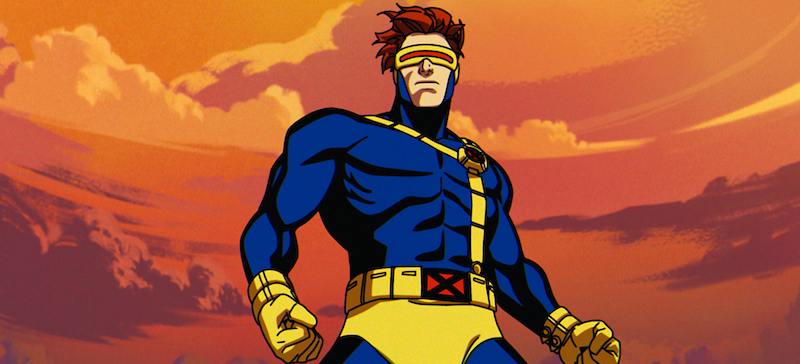
Additionally, since the original X-Men animated series loved the time travel narrative device, Bishop is there to serve as our time-traveling kinetic absorbing mutant who is looking to return home. Once he does, he also finds a reason to help the mutants who have assisted him on his missions and give him a temporary home. But it also comes at a cost, as Cyclops is faced with the difficult decision of wanting to be a father who is always there for his child but is unable to because the time band that Bishop relies on is only powerful enough for two people. Powerless to do anything, Cyclops fears that he is becoming his father, a person who wasn’t there for him when he needed him the most – of course, “The Phoenix Saga” explains all of that.
Since “X-Men ’97” is a revitalization of the Saturday morning cartoon, the series embraces the nostalgia of what made the first four seasons so great while building upon the lore with new stories and amping up the action with an upgraded animation that pops off the screen. The newer aspect ratio also allows for more of a cinematic watching experience. Storm’s powers look even more amazing with a wider screen, and the action is simply stunning.
From the iconic unskippable electric guitar riff intro, the cheesy lines, Beast quoting playwrights and scholars to dazzling world-building and stunning cliffhangers, “X-Men ’97” is built for fans of old and new ones just jumping into it. While it is set in the past, it uses that gap in time to its advantage by reworking some of the prejudices of today in some of the stories. It’s that kind of adaptation that helps make the show stay true to the spirit of the original and source material.
9/10
MARVEL ANIMATION’S “X-MEN ’97” DEBUT ON MARCH 20 only on DISNEY PLUS

